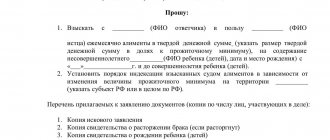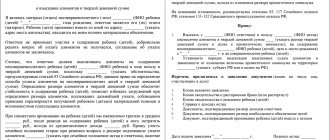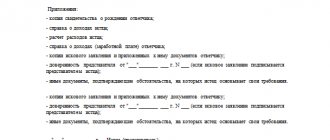Where to get a sample court order for alimony
Orders for the collection of alimony are issued by the magistrate's court. The claimant cannot fill out this document himself and submit it to the judge for approval.
To receive the document, the alimony claimant needs:
- prepare documents confirming the grounds for collecting these funds;
- fill out an application, indicate in it information about the debtor, minor children, and the amount of alimony;
- send the documents to the magistrate’s court at the debtor’s place of residence or at the location of the claimant (if he lives with the child).
Sample court order for the collection of alimony (60.0 KB)
The judge fills out the document in accordance with Art. 127 Code of Civil Procedure of the Russian Federation. Information for filling out the order will be taken from the application and other documents of the claimant.
You can use a sample court order to check that it is completed correctly after it is issued. For example, the judge is required to accurately indicate the percentage of monthly deduction from the debtor's salary or other income. The amount of interest is determined in accordance with the Family Code of the Russian Federation. If the percentages are indicated incorrectly, or the judge made other errors, the claimant may demand changes and then the issuance of an order with corrected content.
Where are the applications for issuing an order?
To receive a court order for alimony, you must fill out the application correctly.
General requirements for its content can be found in the Code of Civil Procedure of the Russian Federation. But there is no standard application form, which can create difficulties for an unprepared claimant. On our website you can apply for a court order for alimony.
It takes into account all legal requirements. Our lawyers will provide assistance in filling out the document.
You can find standard application and claim forms directly in court. They are posted on information stands. But you will have to fill out the application manually, following the standard template. This is inconvenient, since if there is any error, everything will have to be rewritten again. Judicial officials are not required to explain the rules for filling out procedural documents.
The procedure for withholding and the amount of alimony payments
If a court order is issued, the court sets the following monetary amounts:
- for one child – 25%;
- on two – 33.3%;
- for three, four children, and so on - no more than 50% of the defendant’s total earnings.
If the case is examined through a lawsuit, then the procedure for collecting funds is at the discretion of the court. The amount can be set as a percentage of the defendant’s income, in a fixed amount, or in a mixed way - the court chooses the option that satisfies the interests of the child.
Alimony is transferred monthly according to the bank details of the plaintiff.
When establishing the amount of alimony, the court takes into account the father’s position (if he is disabled, unemployed or retired, then the amount of payments will be minimal), the number of other children and dependents, as well as the child’s health.
If the parents voluntarily draw up an agreement, then the amount of alimony cannot be less than the amount that the court would calculate in the same circumstances. Parents have the right to determine any order for the transfer of child support - every week, month or quarter, in a large one-time amount, in the form of a transfer of property.
How to correctly fill out a sample application for a court order
Below we will tell you how to write an application for issuing an order, following the standard template. If you do this yourself, then pay attention to the following nuances:
- you do not need to pay a state fee to submit an application for alimony;
- collection by court order is not allowed for alimony in a fixed amount, since these requirements are controversial (for example, if the debtor does not have a stable income and a permanent source of income). In this case, you will have to go to a court of general jurisdiction;
- Even if the grounds for collecting alimony are supported by documents, the debtor can easily cancel the order.
Cancellation of the order based on the debtor’s objections does not mean that the applicant will not be able to recover money for child support. After the order is cancelled, you will have to file a lawsuit. Claim proceedings last much longer than the process of issuing an order. But in the end, the claimant will still receive the writ of execution and will be able to send it for retention.
Child support can be collected from one of the parents by court order
To issue this writ of execution, you must provide the magistrate with undeniable evidence of your claim. The Magistrate's Court does not have to find out the basis of your request for child support. If there are conflicts or unresolved issues between spouses, then it is necessary to file a claim in a court of general jurisdiction.
What documents are needed to submit an application?
To fill out a sample application, you need to prepare documents confirming the debtor’s obligations. In relation to child support for minor children, these will be the following documents:
- copies of birth certificates for each minor child
- alimony can be recovered only for the debtor’s natural or adopted children; - a copy of the claimant’s passport
- this is necessary to identify the applicant; - a copy of the marriage certificate or its dissolution
- these documents are attached to the application only if available. It is important to remember that the absence of a registered marriage does not entail a refusal to collect alimony. But then you need to officially confirm paternity; - notarized power of attorney
- if the application is signed not by the claimant himself, but by his representative.
When applying for an order, you must provide the required debtor identifiers. They are needed to ensure recovery from the proper person. Identifiers are SNILS and INN numbers, passport series and number, or the entrepreneur’s OGRN, series and number of a driver’s license or vehicle registration certificate.
In the application, you can indicate the debtor’s place of work, if you know it. This will simplify collection during the period when the order reaches the bailiffs. But information about your place of work can also be submitted directly to the FSSP. In addition, the claimant has the opportunity to send a judicial act directly to the employer.
What to include in the content
The claimant himself or his representative can fill out a sample application and submit it to the court. In order for the judge to formalize and issue an order, the application must indicate:
- name of the judicial authority;
- information about the claimant (for child support, an application can be submitted by a parent or other legal representative);
- information about the debtor (at least full name and address, one of the identifiers);
- information about all minor children for whom alimony is being collected;
- information about the debtor’s place of work (if this is known to the applicant);
- a request to the court to issue an order to collect a percentage of the debtor’s earnings;
- list of attached documents;
- date, signature.
The area of justices of the peace to which the application is submitted is selected in accordance with the rules of jurisdiction. The claimant can choose where to go - to the court at the debtor's address or at his place of residence. Applicants living with a child in whose interests the application is being submitted have this right.
If it is known that the debtor does not have a permanent job and stable income, a fixed amount of alimony can be recovered from him. It is determined by the court after examining the property and marital status of the parties and the actual needs of the child. The collection of alimony in a fixed amount, and not as a percentage, is in the nature of a dispute.
Therefore, you cannot apply for a court order in this situation. In this case, you need to file a lawsuit.
In the contents of the order, the judge will indicate information about all children for whom child support will be withheld. In particular, the date of birth will be indicated, since the right to child support under the order remains only until the age of 18 years. In relation to the debtor, his full name, place of birth, and place of work are indicated.
How to calculate the amount of alimony when filling out a sample application
To determine the amount of alimony as a percentage, Article 81 of the Family Code of the Russian Federation is applied. The debtor will be required to:
- 25% of the amount of salary or other income
- in relation to one minor child; - 33% of earnings
- for two children; - 150% of salary or other income
- for three or more children.
Let us note that Art. 81 of the RF IC allows these dimensions to be changed up or down, taking into account the marital or financial situation of the parties.
For example, if the debtor is disabled and in need of financial support, then the amount of alimony obligations may be reduced. But when issuing an order, such issues are not considered. To reduce or increase the amount of alimony, you must submit a separate application to the civil court.
After the order is issued, the debtor may have new child support obligations (for example, after the birth of a child from another marriage). In this case, the initial amount of alimony may be revised at the request of the debtor or a new claimant.
For example:
- Initially, by order, 1/4 of the earnings for the child from the first marriage was recovered;
- after 3 years, an order was filed against the debtor to collect alimony for a child from his second marriage;
- since for two children the penalty is 1/3 of the earnings, then for each child there will be 1/6.
Often, an application for alimony is submitted with the goal of reducing payments for the first child. This is a legal practice because all children have an equal right to receive child support from their parents.
Deadline for issuing the order
The time frame for considering an application and issuing orders for collection is determined by the Code of Civil Procedure of the Russian Federation. Main stages of writ proceedings:
- within 5 days after receiving documents from the claimant, the judge is obliged to issue an order;
- within the next 5 days, the judge must send a copy of the document to the debtor to give him the right to file objections;
- within 10 days after receiving a copy of the order, the debtor may submit objections and seek the cancellation of the judicial act;
- if no objections are received, then after 10 days the judge will issue a sealed order.
If objections are received within 10 days, the judicial act will be annulled. A ruling on this is sent to the parties. After the order is cancelled, the claimant has the right to file a claim.
Unlike lawsuit proceedings, the claimant does not need to wait 30 days for the judicial act to enter into force and receive a writ of execution. The order can be immediately submitted for execution. But in some cases, the debtor can cancel the order after the initiation of proceedings in the FSSP or after the start of deductions at the place of work. You can learn more about this from our lawyers.
What to do if the father does not recognize the child
In this case, the mother will need to visit the district court at the defendant’s address.
The claim is supplemented by the following certificates and papers:
- photocopy of passport;
- a photocopy of the birth certificate of the child;
- evidence of paternity (it is possible to use correspondence, information from witnesses, DNA testing);
- receipt of payment of state duty.
Establishing paternity in court
The court, without taking into account the opinions of the parties and the circumstances of the case, has the right to order a DNA examination. The procedure confirms or denies paternity by 99.9%.
In this case, the court must consider other evidence of paternity presented by the plaintiff.
How to establish paternity through court: step-by-step instructions
Ways to confirm paternity
Expert opinion
Kostenko Tamara Pavlovna
Lawyer with 10 years of experience. Author of numerous articles, teacher of Law
According to current legislation, paternity can be established both pre-trial and through the intervention of justice authorities. Let's look at these two cases in more detail.
If a man recognizes himself as the father, then he, together with the child’s mother, submits an application to the registry office. Then the fact of confirmation of paternity will be the entry in the birth book, as well as the corresponding certificate.
When a person does not recognize the origin of the child, then the collection of alimony during cohabitation presupposes the preliminary establishment of paternity in court. In this case, a claim is filed.
It is worth noting that in this category of cases genetic and other types of examinations are almost always prescribed in case of doubt about the authenticity of the documents provided, such as correspondence.
Documentation
What documents are needed for evidence depends on the situation, but there are some that will be needed in any case.
- passport;
- child's birth certificate;
- marriage or divorce certificate;
- certificate of family composition and income;
- if you have a sick leave certificate for caring for a sick child, then include that too;
- expenses not for the child with calculations, indicate the approximate amount of alimony.
You may need to confirm that:
- the plaintiff does not have his own home;
- there are additional costs for treatment;
- special food and living conditions are required (if necessary for medical reasons).
The bulk of documents are submitted in copies; only certificates must be submitted in the original.
You must take the original documents with you to the court hearing, as the court may request them for review.
Problems of collecting housing alimony
Lawyers analyzing the essence and features of housing alimony in 2021 predict the following problems that may arise in the process of collecting these payments:
- Difficulties arise in determining the standards for the area of residential premises that are needed for the residence of the baby and the parent.
- There are no uniform rules on the basis of which the financial situation of citizens can be analyzed.
- It is not stipulated what kind of evidence the plaintiff must provide in order to receive additional payment as housing alimony.
- The maximum possible amounts that can be spent on home decoration are not reflected.
All of these difficulties can be resolved at the level of judicial practice, so testing the law should take a longer time.
IMPORTANT
In 2021, the State Duma is considering many projects related to the protection of the rights and interests of the child. One of these projects was approved in February 2021, this is housing alimony. Every parent left without support with a child in their arms has the right to demand additional costs for housing. This is an important right that is granted to citizens of the Russian Federation by the Constitution. The decision to assign additional payments is made solely by the court, so it is necessary to carefully prepare for the trial and collect the necessary evidence.
Comments Showing 0 of 0
The amount of housing support in 2021
Paragraph 2 hours 1 tbsp. 86 of the RF IC does not strictly establish the amount of alimony that must be paid to a child for housing in 2021. However, paragraph 8 of the Resolution of the Plenum of the Supreme Court No. indicates that when deciding the issue of assigning alimony obligations and choosing the amount, the court proceeds from the following circumstances:
- Financial situation of citizens: level of income, degree of expenses, number and size of loans from credit institutions, deposits, shares, shares in organizations, value and volume of existing property, securities.
- Family status of the person obligated to pay the funds: whether there are other minor children or other dependents for whom alimony is also paid.
- Disability, health status of the payer.
- Other circumstances that may affect the final decision.
Thus, when issuing a judicial act, the judge considers all the circumstances of the case, analyzes the situation and capabilities of each of the child’s parents in order to assign additional expenses - “housing alimony”.
Basic information
The legislation of the Russian Federation allows filing a claim with the court for alimony without a divorce, when the couple lives together. For example, alimony can be assigned to a wife on maternity leave if the man does not provide her with adequate financial support.
You can also apply for cash payments if you already have alimony - for example, they are transferred to a second child who recently appeared in the family, but the woman, due to her disability, plans to receive it for herself.
It does not matter whether the payer is disabled or unemployed. It is also possible to collect alimony from a parent if he is serving a prison sentence: if he does not transfer funds, he will develop a large debt, which he will need to repay after his release, even if the child has already reached the age of majority.
To get rid of the debt, the parent will need to go to court and prove the fact that, with all its desire, the administration of the institution was not able to provide him with conditions for work.
If a child has been disabled since childhood or was diagnosed with disability after the age of 18, then the alimony provider will need to transfer funds to him throughout his life.
Finally, alimony can also be recovered from a person who has been deprived of parental rights for serious reasons (cruel treatment of a minor, commission of a crime against his life and health, etc.). Lack of parental rights is not a condition for the cancellation of child support obligations.
Is it possible to receive payments in a civil marriage?
Children who were born out of wedlock (illegitimate child) have the same rights as children born during an officially registered union. This means that, according to Russian legislation, both parents are required to support not only themselves, but also their offspring.
However, there are several points regarding the paternity of the baby.
It often happens that without registering a marriage, the father is not always indicated on the birth certificate. There may be several reasons for this, from the mother’s banal reluctance to include the father, to the desire of the common-law family to thus receive additional payments from the state, since single mothers have the right to higher social payments.
Even despite the absence of an entry in the father column, alimony payments can be obtained in court, but more on that below.
Thus, you can give birth in a civil marriage without worrying that the baby may be left without the support of the father.
This is important to know: Response to a statement of claim to an arbitration court: sample 2021
Will the housing alimony law be adopted in 2021?
A bill to approve housing alimony was introduced back in 2021. Deputies proposed expanding the list of grounds for assigning additional expenses for the maintenance of a child, reflected in Art. 86 RF IC. Only in October 2021, the Government of the Russian Federation submitted the prepared project for approval to the State Duma. On February 6, 2021, the initiative was approved, and on February 17, the law came into force.
IMPORTANT
Thus, from February 6, 2021, Article 86 of the RF IC, which implies housing alimony for a child, came into force in a new edition.
Alimony with paternity establishment
If it is necessary to establish paternity, the plaintiff or defendant may petition the court to conduct a DNA examination.
In this case, the consideration of the process is postponed until the information is made public by the expert institution. Typically, the responsibility for paying for the examination and issuing an expert opinion is assigned to the defendants, since, according to general judicial practice, they are the initiators of the procedure for challenging paternity. However, the examination can also be carried out at the expense of the plaintiff, if it is he who petitions to recognize the defendant as the father of a minor child.
Alimony can be collected only after the defendant is fully recognized as the father. It is not allowed to demand recalculation and provision of funds for the previous time in such situations.
The institution of marriage has recently undergone serious changes, more and more married couples do not have official family status, which is assigned after the marriage is registered at the registry office, and here a completely reasonable question arises: what if the family breaks up, how to apply for alimony if you were not a member married, but have children together? We will consider in detail the issue of alimony in a civil marriage in 2021 and everything connected with it in this article.









